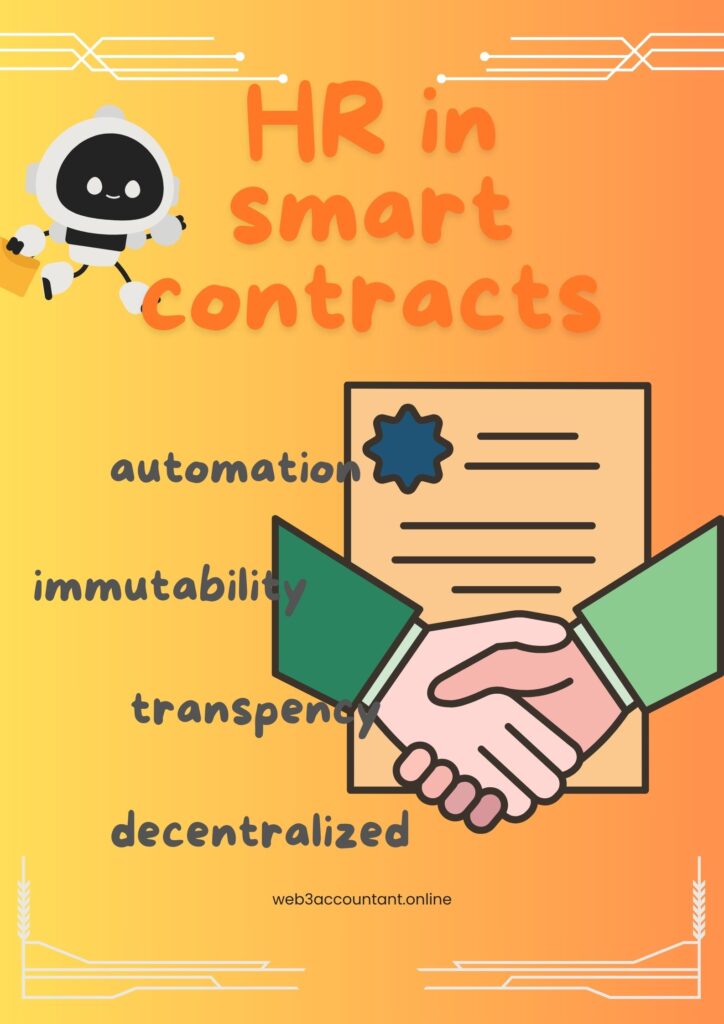
In the Web3 world, smart contracts are decentralized, self-executing agreements written into blockchain code. Unlike traditional systems where central entities control contracts, smart contracts operate without intermediaries, promoting transparency, automation, and efficiency.
Key Features of Smart Contracts in Web3:
- Decentralized Execution: No central authority; everything is managed on platforms like Ethereum.
- Automation: Contracts auto-enforce based on predefined conditions, streamlining processes like payroll or performance bonuses.
- Immutability: Once deployed, the contract cannot be altered, ensuring security and trust.
- Transparency: All parties can see and verify contract terms.
Application in HR:
- Employment Agreements
Smart contracts digitize employment agreements with predefined terms, automating events like salary payments or bonuses, reducing reliance on intermediaries.
- Automated Payroll
These contracts automatically release payments when conditions (e.g., hours worked) are met, cutting administrative time and costs, especially for global transactions.
- Performance Reviews
KPIs and performance metrics are built into smart contracts, triggering reviews or salary adjustments without human bias.
- Employee Benefits
Smart contracts track benefits like leave entitlements, simplifying HR management and improving accuracy.
- Freelancers and Contractors
Smart contracts provide secure, instant payments to freelance workers when milestones are achieved, ensuring timely and transparent compensation.
- Secure Employee Records
Blockchain-stored employee records are tamper-proof and transparent, allowing easy audit trials and security of sensitive data.
The Pros and Cons
Smart contracts in HR processes offer several advantages and disadvantages that organizations need to consider.
Pros include significant automation, which reduces the burden of manual HR tasks, freeing up time for strategic initiatives. They also provide transparency, as all contract terms are clearly visible and immutable, fostering trust among employees. Additionally, smart contracts enhance efficiency by facilitating faster execution of agreements, thus minimizing administrative delays. Furthermore, they can lead to cost savings by eliminating the need for intermediaries, streamlining the HR workflow.
On the downside, rigidity is a major drawback, as smart contracts are difficult to alter once deployed. A viable solution is to create layered contracts with appendices that allow for easier updates. Another issue is complexity, which requires technical expertise that may not be readily available within the HR department. To address this, organizations should invest in training HR staff or collaborate with blockchain experts. Additionally, the legal uncertainty surrounding smart contracts in certain regions can pose challenges. Partnering with legal professionals can help ensure compliance with applicable regulations. Lastly, there may be adoption barriers as employees may struggle to understand blockchain concepts. Providing comprehensive training and user-friendly tools can facilitate smoother adoption and encourage confidence in using smart contracts within HR processes.
Smart contracts present a transformative opportunity for HR processes in the Web3 landscape. By leveraging the decentralized, automated, and transparent nature of these agreements, organizations can enhance efficiency, reduce administrative burdens, and foster trust among employees. While challenges such as rigidity, complexity, legal uncertainties, and adoption barriers exist, strategic solutions and proactive training can pave the way for successful integration. As more organizations explore the potential of smart contracts, the HR industry stands on the brink of a new era, where technology not only streamlines operations but also redefines the relationship between employers and employees in a rapidly evolving digital economy.

